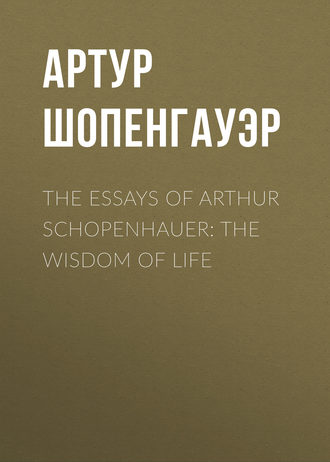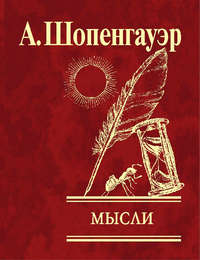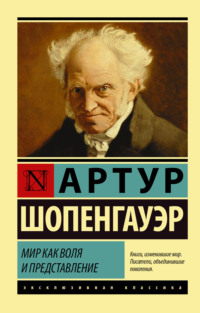 полная версия
полная версияThe Essays of Arthur Schopenhauer: the Wisdom of Life
It is quite true that pride is something which is generally found fault with, and cried down; but usually, I imagine, by those who have nothing upon which they can pride themselves. In view of the impudence and foolhardiness of most people, anyone who possesses any kind of superiority or merit will do well to keep his eyes fixed on it, if he does not want it to be entirely forgotten; for if a man is good-natured enough to ignore his own privileges, and hob-nob with the generality of other people, as if he were quite on their level, they will be sure to treat him, frankly and candidly, as one of themselves. This is a piece of advice I would specially offer to those whose superiority is of the highest kind – real superiority, I mean, of a purely personal nature – which cannot, like orders and titles, appeal to the eye or ear at every moment; as, otherwise, they will find that familiarity breeds contempt, or, as the Romans used to say, sus Minervam. Joke with a slave, and he'll soon show his heels, is an excellent Arabian proverb; nor ought we to despise what Horace says,
Sume superbiam Quaesitam meritis.
– usurp the fame you have deserved. No doubt, when modesty was made a virtue, it was a very advantageous thing for the fools; for everybody is expected to speak of himself as if he were one. This is leveling down indeed; for it comes to look as if there were nothing but fools in the world.
The cheapest sort of pride is national pride; for if a man is proud of his own nation, it argues that he has no qualities of his own of which he can be proud; otherwise he would not have recourse to those which he shares with so many millions of his fellowmen. The man who is endowed with important personal qualities will be only too ready to see clearly in what respects his own nation falls short, since their failings will be constantly before his eyes. But every miserable fool who has nothing at all of which he can be proud adopts, as a last resource, pride in the nation to which he belongs; he is ready and glad to defend all its faults and follies tooth and nail, thus reimbursing himself for his own inferiority. For example, if you speak of the stupid and degrading bigotry of the English nation with the contempt it deserves, you will hardly find one Englishman in fifty to agree with you; but if there should be one, he will generally happen to be an intelligent man.
The Germans have no national pride, which shows how honest they are, as everybody knows! and how dishonest are those who, by a piece of ridiculous affectation, pretend that they are proud of their country – the Deutsche Bruder and the demagogues who flatter the mob in order to mislead it. I have heard it said that gunpowder was invented by a German. I doubt it. Lichtenberg asks, Why is it that a man who is not a German does not care about pretending that he is one; and that if he makes any pretence at all, it is to be a Frenchman or an Englishman?38
However that may be, individuality is a far more important thing than nationality, and in any given man deserves a thousand-fold more consideration. And since you cannot speak of national character without referring to large masses of people, it is impossible to be loud in your praises and at the same time honest. National character is only another name for the particular form which the littleness, perversity and baseness of mankind take in every country. If we become disgusted with one, we praise another, until we get disgusted with this too. Every nation mocks at other nations, and all are right.
The contents of this chapter, which treats, as I have said, of what we represent in the world, or what we are in the eyes of others, may be further distributed under three heads: honor rank and fame.
Section 3. – Rank.
Let us take rank first, as it may be dismissed in a few words, although it plays an important part in the eyes of the masses and of the philistines, and is a most useful wheel in the machinery of the State.
It has a purely conventional value. Strictly speaking, it is a sham; its method is to exact an artificial respect, and, as a matter of fact, the whole thing is a mere farce.
Orders, it may be said, are bills of exchange drawn on public opinion, and the measure of their value is the credit of the drawer. Of course, as a substitute for pensions, they save the State a good deal of money; and, besides, they serve a very useful purpose, if they are distributed with discrimination and judgment. For people in general have eyes and ears, it is true; but not much else, very little judgment indeed, or even memory. There are many services of the State quite beyond the range of their understanding; others, again, are appreciated and made much of for a time, and then soon forgotten. It seems to me, therefore, very proper, that a cross or a star should proclaim to the mass of people always and everywhere, This man is not like you; he has done something. But orders lose their value when they are distributed unjustly, or without due selection, or in too great numbers: a prince should be as careful in conferring them as a man of business is in signing a bill. It is a pleonasm to inscribe on any order for distinguished service; for every order ought to be for distinguished service. That stands to reason.
Section 4. – Honor.
Honor is a much larger question than rank, and more difficult to discuss. Let us begin by trying to define it.
If I were to say Honor is external conscience, and conscience is inward honor, no doubt a good many people would assent; but there would be more show than reality about such a definition, and it would hardly go to the root of the matter. I prefer to say, Honor is, on its objective side, other people's opinion of what we are worth; on its subjective side, it is the respect we pay to this opinion. From the latter point of view, to be a man of honor is to exercise what is often a very wholesome, but by no means a purely moral, influence.
The feelings of honor and shame exist in every man who is not utterly depraved, and honor is everywhere recognized as something particularly valuable. The reason of this is as follows. By and in himself a man can accomplish very little; he is like Robinson Crusoe on a desert island. It is only in society that a man's powers can be called into full activity. He very soon finds this out when his consciousness begins to develop, and there arises in him the desire to be looked upon as a useful member of society, as one, that is, who is capable of playing his part as a man —pro parte virili– thereby acquiring a right to the benefits of social life. Now, to be a useful member of society, one must do two things: firstly, what everyone is expected to do everywhere; and, secondly, what one's own particular position in the world demands and requires.
But a man soon discovers that everything depends upon his being useful, not in his own opinion, but in the opinion of others; and so he tries his best to make that favorable impression upon the world, to which he attaches such a high value. Hence, this primitive and innate characteristic of human nature, which is called the feeling of honor, or, under another aspect, the feeling of shame —verecundia. It is this which brings a blush to his cheeks at the thought of having suddenly to fall in the estimation of others, even when he knows that he is innocent, nay, even if his remissness extends to no absolute obligation, but only to one which he has taken upon himself of his own free will. Conversely, nothing in life gives a man so much courage as the attainment or renewal of the conviction that other people regard him with favor; because it means that everyone joins to give him help and protection, which is an infinitely stronger bulwark against the ills of life than anything he can do himself.
The variety of relations in which a man can stand to other people so as to obtain their confidence, that is, their good opinion, gives rise to a distinction between several kinds of honor, resting chiefly on the different bearings that meum may take to tuum; or, again, on the performance of various pledges; or finally, on the relation of the sexes. Hence, there are three main kinds of honor, each of which takes various forms – civic honor, official honor, and sexual honor.
Civic honor has the widest sphere of all. It consists in the assumption that we shall pay unconditional respect to the rights of others, and, therefore, never use any unjust or unlawful means of getting what we want. It is the condition of all peaceable intercourse between man and man; and it is destroyed by anything that openly and manifestly militates against this peaceable intercourse, anything, accordingly, which entails punishment at the hands of the law, always supposing that the punishment is a just one.
The ultimate foundation of honor is the conviction that moral character is unalterable: a single bad action implies that future actions of the same kind will, under similar circumstances, also be bad. This is well expressed by the English use of the word character as meaning credit, reputation, honor. Hence honor, once lost, can never be recovered; unless the loss rested on some mistake, such as may occur if a man is slandered or his actions viewed in a false light. So the law provides remedies against slander, libel, and even insult; for insult though it amounts to no more than mere abuse, is a kind of summary slander with a suppression of the reasons. What I mean may be well put in the Greek phrase – not quoted from any author – [Greek: estin hae loidoria diabolae]. It is true that if a man abuses another, he is simply showing that he has no real or true causes of complaint against him; as, otherwise, he would bring these forward as the premises, and rely upon his hearers to draw the conclusion themselves: instead of which, he gives the conclusion and leaves out the premises, trusting that people will suppose that he has done so only for the sake of being brief.
Civic honor draws its existence and name from the middle classes; but it applies equally to all, not excepting the highest. No man can disregard it, and it is a very serious thing, of which every one should be careful not to make light. The man who breaks confidence has for ever forfeited confidence, whatever he may do, and whoever he may be; and the bitter consequences of the loss of confidence can never be averted.
There is a sense in which honor may be said to have a negative character in opposition to the positive character of fame. For honor is not the opinion people have of particular qualities which a man may happen to possess exclusively: it is rather the opinion they have of the qualities which a man may be expected to exhibit, and to which he should not prove false. Honor, therefore, means that a man is not exceptional; fame, that he is. Fame is something which must be won; honor, only something which must not be lost. The absence of fame is obscurity, which is only a negative; but loss of honor is shame, which is a positive quality. This negative character of honor must not be confused with anything passive; for honor is above all things active in its working. It is the only quality which proceeds directly from the man who exhibits it; it is concerned entirely with what he does and leaves undone, and has nothing to do with the actions of others or the obstacles they place in his way. It is something entirely in our own power – [Greek: ton ephaemon]. This distinction, as we shall see presently, marks off true honor from the sham honor of chivalry.
Slander is the only weapon by which honor can be attacked from without; and the only way to repel the attack is to confute the slander with the proper amount of publicity, and a due unmasking of him who utters it.
The reason why respect is paid to age is that old people have necessarily shown in the course of their lives whether or not they have been able to maintain their honor unblemished; while that of young people has not been put to the proof, though they are credited with the possession of it. For neither length of years, – equalled, as it is, and even excelled, in the case of the lower animals, – nor, again, experience, which is only a closer knowledge of the world's ways, can be any sufficient reason for the respect which the young are everywhere required to show towards the old: for if it were merely a matter of years, the weakness which attends on age would call rather for consideration than for respect. It is, however, a remarkable fact that white hair always commands reverence – a reverence really innate and instinctive. Wrinkles – a much surer sign of old age – command no reverence at all; you never hear any one speak of venerable wrinkles; but venerable white hair is a common expression.
Honor has only an indirect value. For, as I explained at the beginning of this chapter, what other people think of us, if it affects us at all, can affect us only in so far as it governs their behavior towards us, and only just so long as we live with, or have to do with, them. But it is to society alone that we owe that safety which we and our possessions enjoy in a state of civilization; in all we do we need the help of others, and they, in their turn, must have confidence in us before they can have anything to do with us. Accordingly, their opinion of us is, indirectly, a matter of great importance; though I cannot see how it can have a direct or immediate value. This is an opinion also held by Cicero. I quite agree, he writes, with what Chrysippus and Diogenes used to say, that a good reputation is not worth raising a finger to obtain, if it were not that it is so useful.39 This truth has been insisted upon at great length by Helvetius in his chief work De l'Esprit,40 the conclusion of which is that we love esteem not for its own sake, but solely for the advantages which it brings. And as the means can never be more than the end, that saying, of which so much is made, Honor is dearer than life itself, is, as I have remarked, a very exaggerated statement. So much then, for civic honor.
Official honor is the general opinion of other people that a man who fills any office really has the necessary qualities for the proper discharge of all the duties which appertain to it. The greater and more important the duties a man has to discharge in the State, and the higher and more influential the office which he fills, the stronger must be the opinion which people have of the moral and intellectual qualities which render him fit for his post. Therefore, the higher his position, the greater must be the degree of honor paid to him, expressed, as it is, in titles, orders and the generally subservient behavior of others towards him. As a rule, a man's official rank implies the particular degree of honor which ought to be paid to him, however much this degree may be modified by the capacity of the masses to form any notion of its importance. Still, as a matter of fact, greater honor is paid to a man who fulfills special duties than to the common citizen, whose honor mainly consists in keeping clear of dishonor.
Official honor demands, further, that the man who occupies an office must maintain respect for it, for the sake both of his colleagues and of those who will come after him. This respect an official can maintain by a proper observance of his duties, and by repelling any attack that may be made upon the office itself or upon its occupant: he must not, for instance, pass over unheeded any statement to the effect that the duties of the office are not properly discharged, or that the office itself does not conduce to the public welfare. He must prove the unwarrantable nature of such attacks by enforcing the legal penalty for them.
Subordinate to the honor of official personages comes that of those who serve the State in any other capacity, as doctors, lawyers, teachers, anyone, in short, who, by graduating in any subject, or by any other public declaration that he is qualified to exercise some special skill, claims to practice it; in a word, the honor of all those who take any public pledges whatever. Under this head comes military honor, in the true sense of the word, the opinion that people who have bound themselves to defend their country really possess the requisite qualities which will enable them to do so, especially courage, personal bravery and strength, and that they are perfectly ready to defend their country to the death, and never and under any circumstances desert the flag to which they have once sworn allegiance. I have here taken official honor in a wider sense than that in which it is generally used, namely, the respect due by citizens to an office itself.
In treating of sexual honor and the principles on which it rests, a little more attention and analysis are necessary; and what I shall say will support my contention that all honor really rests upon a utilitarian basis. There are two natural divisions of the subject – the honor of women and the honor of men, in either side issuing in a well-understood esprit de corps. The former is by far the more important of the two, because the most essential feature in woman's life is her relation to man.
Female honor is the general opinion in regard to a girl that she is pure, and in regard to a wife that she is faithful. The importance of this opinion rests upon the following considerations. Women depend upon men in all the relations of life; men upon women, it might be said, in one only. So an arrangement is made for mutual interdependence – man undertaking responsibility for all woman's needs and also for the children that spring from their union – an arrangement on which is based the welfare of the whole female race. To carry out this plan, women have to band together with a show of esprit de corps, and present one undivided front to their common enemy, man, – who possesses all the good things of the earth, in virtue of his superior physical and intellectual power, – in order to lay siege to and conquer him, and so get possession of him and a share of those good things. To this end the honor of all women depends upon the enforcement of the rule that no woman should give herself to a man except in marriage, in order that every man may be forced, as it were, to surrender and ally himself with a woman; by this arrangement provision is made for the whole of the female race. This is a result, however, which can be obtained only by a strict observance of the rule; and, accordingly, women everywhere show true esprit de corps in carefully insisting upon its maintenance. Any girl who commits a breach of the rule betrays the whole female race, because its welfare would be destroyed if every woman were to do likewise; so she is cast out with shame as one who has lost her honor. No woman will have anything more to do with her; she is avoided like the plague. The same doom is awarded to a woman who breaks the marriage tie; for in so doing she is false to the terms upon which the man capitulated; and as her conduct is such as to frighten other men from making a similar surrender, it imperils the welfare of all her sisters. Nay, more; this deception and coarse breach of troth is a crime punishable by the loss, not only of personal, but also of civic honor. This is why we minimize the shame of a girl, but not of a wife; because, in the former case, marriage can restore honor, while in the latter, no atonement can be made for the breach of contract.
Once this esprit de corps is acknowledged to be the foundation of female honor, and is seen to be a wholesome, nay, a necessary arrangement, as at bottom a matter of prudence and interest, its extreme importance for the welfare of women will be recognized. But it does not possess anything more than a relative value. It is no absolute end, lying beyond all other aims of existence and valued above life itself. In this view, there will be nothing to applaud in the forced and extravagant conduct of a Lucretia or a Virginius – conduct which can easily degenerate into tragic farce, and produce a terrible feeling of revulsion. The conclusion of Emilia Galotti, for instance, makes one leave the theatre completely ill at ease; and, on the other hand, all the rules of female honor cannot prevent a certain sympathy with Clara in Egmont. To carry this principle of female honor too far is to forget the end in thinking of the means – and this is just what people often do; for such exaggeration suggests that the value of sexual honor is absolute; while the truth is that it is more relative than any other kind. One might go so far as to say that its value is purely conventional, when one sees from Thomasius how in all ages and countries, up to the time of the Reformation, irregularities were permitted and recognized by law, with no derogation to female honor, – not to speak of the temple of Mylitta at Babylon.41
There are also of course certain circumstances in civil life which make external forms of marriage impossible, especially in Catholic countries, where there is no such thing as divorce. Ruling princes everywhere, would, in my opinion, do much better, from a moral point of view, to dispense with forms altogether rather than contract a morganatic marriage, the descendants of which might raise claims to the throne if the legitimate stock happened to die out; so that there is a possibility, though, perhaps, a remote one, that a morganatic marriage might produce a civil war. And, besides, such a marriage, concluded in defiance of all outward ceremony, is a concession made to women and priests – two classes of persons to whom one should be most careful to give as little tether as possible. It is further to be remarked that every man in a country can marry the woman of his choice, except one poor individual, namely, the prince. His hand belongs to his country, and can be given in marriage only for reasons of State, that is, for the good of the country. Still, for all that, he is a man; and, as a man, he likes to follow whither his heart leads. It is an unjust, ungrateful and priggish thing to forbid, or to desire to forbid, a prince from following his inclinations in this matter; of course, as long as the lady has no influence upon the Government of the country. From her point of view she occupies an exceptional position, and does not come under the ordinary rules of sexual honor; for she has merely given herself to a man who loves her, and whom she loves but cannot marry. And in general, the fact that the principle of female honor has no origin in nature, is shown by the many bloody sacrifices which have been offered to it, – the murder of children and the mother's suicide. No doubt a girl who contravenes the code commits a breach of faith against her whole sex; but this faith is one which is only secretly taken for granted, and not sworn to. And since, in most cases, her own prospects suffer most immediately, her folly is infinitely greater than her crime.
The corresponding virtue in men is a product of the one I have been discussing. It is their esprit de corps, which demands that, once a man has made that surrender of himself in marriage which is so advantageous to his conqueror, he shall take care that the terms of the treaty are maintained; both in order that the agreement itself may lose none of its force by the permission of any laxity in its observance, and that men, having given up everything, may, at least, be assured of their bargain, namely, exclusive possession. Accordingly, it is part of a man's honor to resent a breach of the marriage tie on the part of his wife, and to punish it, at the very least by separating from her. If he condones the offence, his fellowmen cry shame upon him; but the shame in this case is not nearly so foul as that of the woman who has lost her honor; the stain is by no means of so deep a dye —levioris notae macula; – because a man's relation to woman is subordinate to many other and more important affairs in his life. The two great dramatic poets of modern times have each taken man's honor as the theme of two plays; Shakespeare in Othello and The Winter's Tale, and Calderon in El medico de su honra, (The Physician of his Honor), and A secreto agravio secreta venganza, (for Secret Insult Secret Vengeance). It should be said, however, that honor demands the punishment of the wife only; to punish her paramour too, is a work of supererogation. This confirms the view I have taken, that a man's honor originates in esprit de corps.









